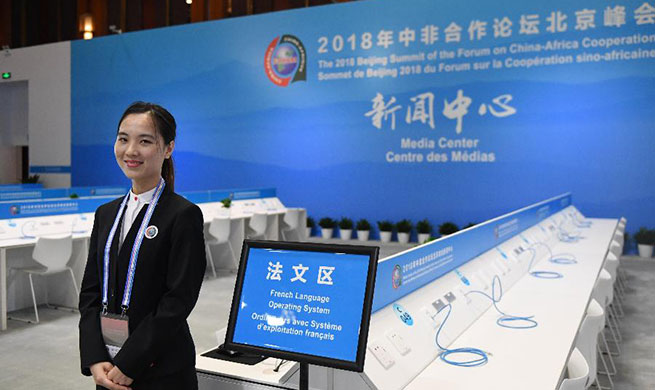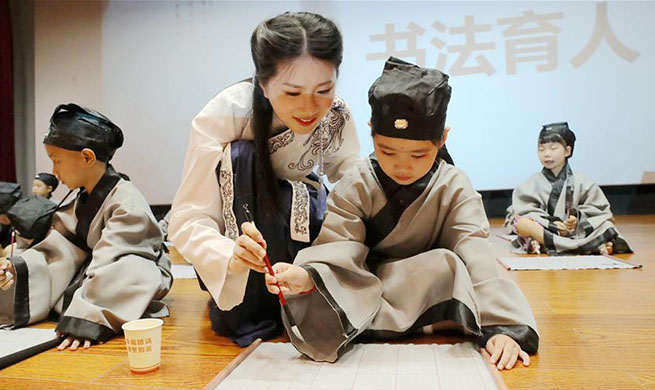by Xinhua writers Zhang Dailei, Gu Zhenqiu
LONDON, Aug. 30 (Xinhua) -- China should be proud about the changes and achievements that are happening in its education sectors since the country's reform and opening up 40 years ago, said a senior expert at a renowned international education association.
Kevin Ruth, chief executive of the London-based Educational Collaborative for International Schools (ECIS), told Xinhua in a recent interview that ECIS, one of the world's oldest and biggest international school organization established in 1965, has realized China's flourishing need for international education cooperation and thus looked into China through building up partnership with Chinese schools.
EXPANDING EDUCATIONAL OPPORTUNITIES
He said China, since its implementation of reform and opening up policy, wants its citizens to have a very international perspective while being rooted in their home culture.
"Internationalized education is a good way to help the citizens understand the relationship between their home culture and the different international cultures. The interactions that a country's citizens have with citizens from other countries translate into influence of that country on the international scale. And I think from what I've read and what I've seen, that's the direction in particular that China is looking to go," he noted.
The total number of Chinese people who have overseas study experience has reached over 5 million during the past 40 years, and the year 2017 alone saw more than 600,000 Chinese students studying abroad, according to latest statistics released by Chinese government.
"Chinese citizens studying or working in other cultures are representatives of China. In some ways people come to know you and to learn about your culture and appreciate you more," Ruth said. "Ideally this will lead to better conflict resolution and more peaceful relations around the world."
At the same time, an increased number of bilingual and international schools have been set up in China, which is "the demonstrable evidence that China is very intentional about opening up to expand educational opportunities for its citizens," said the expert, adding that he believes the Chinese educational reforms have positive carry-on effect over generations.
LOOKING EAST
Since his appointment as the head of ECIS in 2014, Ruth has began to lead the Europe-focused organization to look towards East.
"Historically, people look to Europe for international education as benchmark, because of the quality and heritage. But having visited other areas of the world, I feel that in China, southeast Asia, Middle East, there is so much going on in terms of schools and the amount of innovation and there are high quality schools elsewhere in the world. And now Europe is slowly beginning to look East to think what are they doing."
For decades ECIS, originally named as the European Council of International Schools, served its members from European and American countries. Now it updated its name, with the aim to reflect its growing global membership while keeping the same acronym.
Last year, ECIS opened its very first office in China, providing services to both international schools and local educational institutes in China who have the desire to improve and maintain their qualities. It has so far drawn about a dozen members in China, doing business both in English and Mandarin.
The ECIS China office also plans to launch an international education forum in Beijing next March.
REMARKABLE CHANGES
Having visited some schools in China, Ruth said he saw some "very remarkable, forward-thinking" Chinese schools.
"For example, one bilingual kindergarten we visited in Beijing is probably the most modern, progressive forward-thinking kindergarten I have ever visited anywhere," he said.
"They knew their methodology of education very well and they had constructed an environment that stimulates children. It was just not about test, not about measuring standards. It's about helping the children's curiosity grow, making sure the children understand their surroundings, making sure they are learning Chinese and English. What they had done was to look at several models, I believe both from America and Britain, but they translate these models into a context that makes sense in Beijing because the students are all Chinese," he recalled.
The expert also noted that the number of international students coming to study at Chinese universities is increasing, which demonstrates that the quality, fame and international perspective of Chinese universities are improving steadily.
"Some people think Chinese educations are very strict, without changing. And they hear that Chinese families are interested in new things like curiosity or autonomy education but they don't believe it's happening yet. But I saw it. It is happening, in the schools that are more advanced than some other schools I've seen in the UK, in the U.S., and elsewhere. So I think China should feel very proud about the fact that these changes are already happening," said Ruth.













